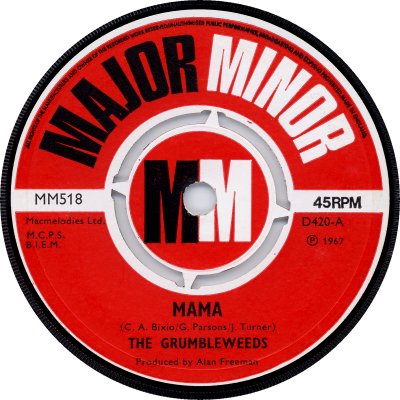
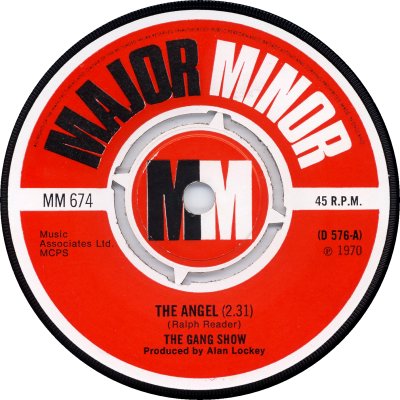
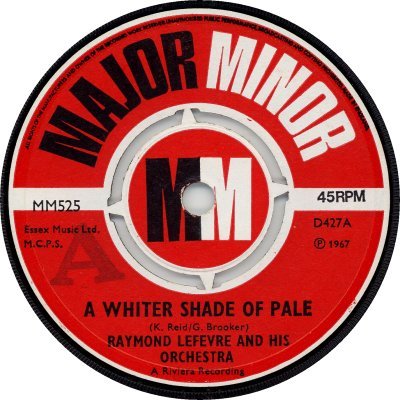
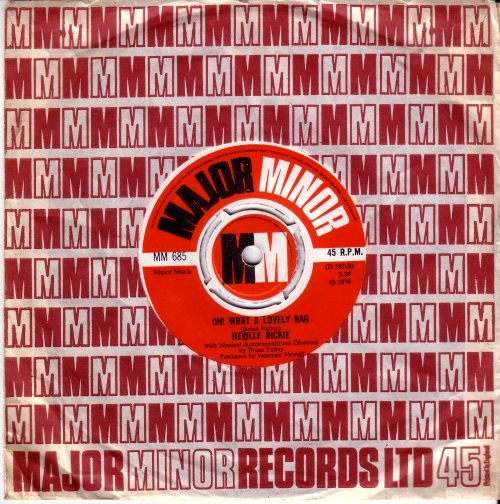
A mixed bag of a label, owned by Phil Solomon, who was manager of Rock band Them and an executive director of Radio Caroline. An idea of the variety of the company's output may be gained by examining some of the acts with which they had hits: American outfits Tommy James & The Shondells and Crazy Elephant, Irish folk group The Dubliners, Jazz / Ragtime pianist Neville Dickie, Soul / Reggae vocalist Johnny Nash, MOR singer Malcolm Roberts, and heavy-breathing duo Jane Birkin and Serge Gainsbourg. During the five years or so of its existence (late 1966 to mid 1970) Major Minor put out Soul, Irish Pop, Irish Folk, Scottish Folk, Country, Easy Listening, Reggae, Psychedelic Pop, Rock and Novelty records - it wasn't an easy label to pigeonhole. Its chart successes all came in the '60s; it survived into 1970, but was destined not to see the end of it.
The first hints that the new label might be in the offing came in 'Billboard' of the 2nd of July 1966, which said that Solomon had been in discussions with British independent companies about forming a record label named after the radio station with which he was involved. For some reason the 'Caroline' name seems to have been dropped, and by the time 'BB' of the 13th of August carried an announcement by Solomon that his new 'independent Pop singles label' was gearing up to go the name 'Major Minor' had been adopted. At that point the launch was scheduled for the 29th of September; a distribution deal had not been fixed but was 'near'. More information was provided by 'Billboard' of the 3rd of December 1966, which said that CBS was to press the company's singles and Selecta was to handle distribution; the first single, by Irish band The O'Brien Brothers, was already available - it appears to have been released in November rather than at the end of September. 'BB' of the 18th of March 1967 observed that the Major Minor's records were benefitting from exposure on Radio Caroline, thanks to Solomon's involvement with both; it added that he was 'intensifying' the label's operations. The issue of the 15th of April provided evidence of that intensification when it reported that material from Barclay Records' offshoot Riviera was being released through Major Minor, the first fruits being singles by The Darwin's Theory and Peter Holm. By that time the company was enjoying its first Chart success, in the rather unlikely form of The Dubliners' 'Seven Drunken Nights' b/w 'Paddy On The Railway' (MM-506; 3/67), which reached the No.7 position. The group went on to score twice more, albeit not so highly.
American company Roulette came on board in April 1967. An article in 'BB' for the 6th of May appears to suggest that the intention was for its products to be released on its own label - apparently there was a problem when the first single under the agreement initially came out without a Roulette logo - but they were issued on Major Minor with a credit to Roulette until September 1968. It was a single licensed from Roulette that gave Major Minor its first No.1: Tommy James & The Shondells reached that coveted spot in June with 'Mony Mony' b/w 'One Two Three And I Fell' (MM-567; 5/68). 1968 also saw the introduction of a short-loved Soul label, Toast, in January, while towards the end of the year 'Record Retailer' reported that Major Minor had picked up the rights to the American label JAD. According to the RR article JAD records were intended to come out under the JAD logo in the new year, but again they were issued on Major Minor with a just credit to the originating company.
1969 was a good year for Major Minor. Johnny Nash reached No.6 in the Charts with two consecutive singles, 'You Got Soul' b/w 'Don't Cry' (MM-586; 1/69) and 'Cupid' b/w 'People In Love' (MM-603; 6/69), both sourced from JAD; and Karen Roberts also stalled at No.6 with her version of 'Nobody's Child' b/w 'Send Me The Pillow That You Dream On' (MM-625; 7/69). Having got to No.8 late in the previous year with' May I Have The Next Dream With You' b/w 'Where Did I Go Wrong' (MM-581; 10/68) Malcolm Roberts fell four places short of that mark with 'Love Is All' b/w 'Eva Magdalena' (MM-637; 11/69); and Crazy Elephant's 'Gimme Gimme Good Lovin'' b/w 'Dark Part Of My Mind' (MM-609; 4/69) also just failed to crack the Top Ten. Neville Dickie and The Second City Sound chipped in with lesser hits, but when in response to moral outrage Fontana dropped the controversial hit 'Je T' Aime ... Moi Non Plus' by Jane Birkin & Serge Gainsbourg, in October, Major Minor picked it up and enjoyed another No.1 with it, as MM-654. One of the company's non-hits from that year, 'Mr. Moody's Garden' b/w 'I Wish I Could |Cry' (MM-613; 5/69) was by an artist, 'Gilbert', who went on to become a Chart regular as Gilbert O'Sullivan.
At the start of the '70s Solomon still had ambitions to develop his company. 'Record Retailer' of the 28th of February 1970 reported that Major Minor was planning to introduce a Country music label, called 'Country' logically enough, later in the year; a talent search was intended to source product for it, but it might feature some licensed items as well. A fortnight later 'RR' (14th March) revealed that a new and as yet un-named Progressive label was also on the cards. 'RR' of the 28th of March had a little more news about the 'Country' label: it was to be headed by Pat Campbell but it had yet to make its debut. As late as July 1970 there came news of another prospective label: 'RR' of the 11th of that month said that, starting in August, Major Minor was to release material from the Irish company Dolphin (q.v.) on a special label.
Sadly, none of these plans were to bear fruit. There had apparently been rumours about a possible purchase by Decca; in an article in 'RR' of the 8th of August 1970 a company spokesman denied that these were true. In another article three weeks later (29th August) Solomon stated that he was "not winding up Major Minor", despite widespread rumours of a sale to Decca and of EMI acquiring the company's licensing rights; changes currently taking place were "part of a major revamp to the company." A fortnight later, however, 'RR' (12th September) broke the news that the worldwide rights to Major Minor's catalogue and its licensing agreements had been sold to EMI. Starting in the new year material owned by the company would appear on EMI's own labels, and it would cease to exist as a label in its own right. 'Billboard' of the 20th of February 1971 reported that creditors including Decca, Radio Luxembourg and the Mechanical Copyright Protection Society had proposed that Major Minor go into liquidation. Finally 'RR' of the 27th of March 1971 carried the company's obituary: it had been wound up on the previous Monday. On a more upbeat note, Solomon made a return to the record business in 1975, with his 'Galaxy' label (q.v.). His brother Mervyn was in the same line of work, and was responsible for the long-running 'Emerald' label, along with its offshoots 'Mint' and 'M And M' (q.v. all).
Major Minor singles were numbered in an MM-500 series, beginning at MM-500 and ending up at MM-720. MM-721 appeared forty years after MM-720, in 2010, when the label was revived for a series of records by Morrissey, who must have a nostalgic affection for it. Manufacture was by CBS initially, with Decca / Selecta handling distribution, but from late 1967 Decca performed both functions; the Jane Birkin & Serge Gainsbourg single proved too naughty for Decca's distribution arm and was handled by independent distributors Keith Prowse ('RR', 27th September 1969). The label design stayed the same throughout, though there were minor differences between the CBS (1) and Decca (2) typefaces - the 'RPM' at 3 o'clock gained separating full-stops at the time of the changeover, and the title and artist credits reduced in size somewhat. Some popular singles can be found with both kinds of label. Demo copies of a few early singles had white labels with a large red 'A' on them; later ones had a hand-stamped 'A' on them (3). According to 'RR' of 2 the 5th of February 1969 Major Minor did its own promotion work. The discography below only covers 1970.
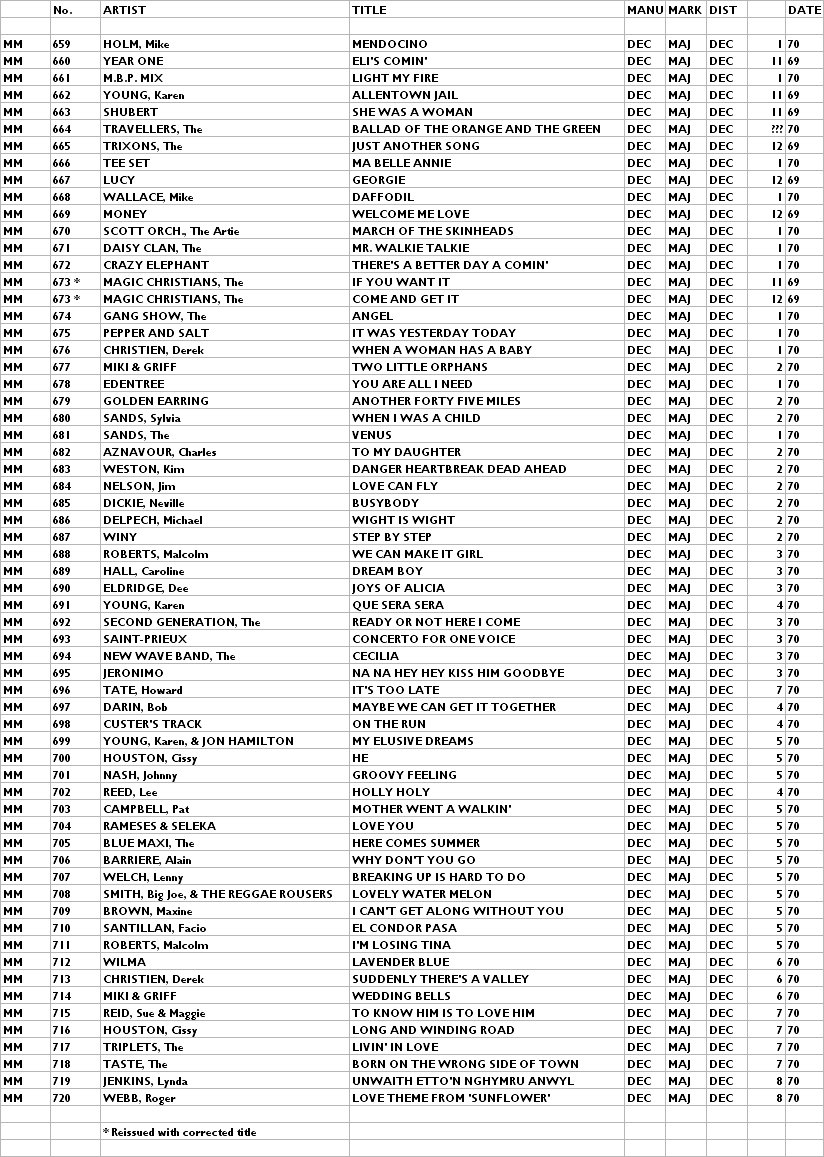


Copyright 2006 Robert Lyons.

